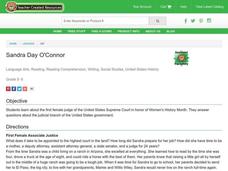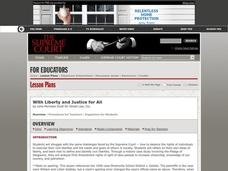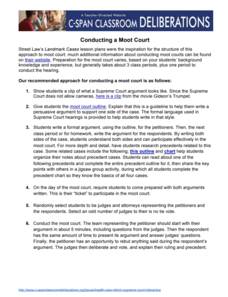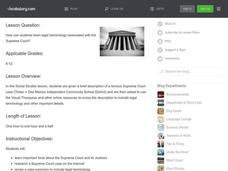Curated OER
Selecting a Chief Justice For The United States Supreme Court: The Senate Confirmation Hearings of Judge John Roberts, Jr.
Students review the procedures for selecting a new Supreme Court Justice. In groups, they determine which questions the nominee should be asked and practice asking the questions with a classmate. They watch the confirmation hearings...
Curated OER
Sandra Day O'Connor
No unit on important women in history would be complete without a lesson on Sandra Day O'Connor. After reading background information about the first female Supreme Court justice, middle schoolers engage in several activities addressing...
Curated OER
The Bill of Rights and the Supreme Court
Students explore what the United States would be like today if the Bill of Rights had never been written. In this exploring the constitution lesson, students research Supreme Court cases that were heard in the early years of the...
Curated OER
With Liberty and Justice for All
Young scholars examine the role of Supreme Court justices. In this judicial branch lesson, students consider the civil rights and civil liberties as they investigate Minersville School District v. Gobitis (1940) and West Virginia State...
C-SPAN
Voting Discrimination and the Effects of Shelby County v. Holder
Show students that every vote counts as they debate the federal government 's role in protecting voting rights in historically racially discriminated areas. In the Supreme Court case Shelby County v. Holder, the high court found...
C-SPAN
Conducting a Moot Court
Review the conduct of different roles within the Supreme Court. A moot court activity educates learners about the roles of each member of the court and the process of a case with video clips, research activities, a graphic organizer,...
Curated OER
Justices for All
Students examine role of Supreme Court justices in the American political process, research the qualities of the current Supreme Court justices, and write opinion papers evaluating the current justices and recommending future nominations.
Curated OER
The Legacy of the Warren Court
Students examine the major decisions by the Supreme Court when Warren was the Chief Justice. In groups, they research the life and other works of Earl Warren and discuss how ones background can influence decisions. They also examine...
PBS
Analyzing McCulloch v. Maryland
What happened in the Supreme Court case of McCulloch v. Maryland? The resource teaches the specifics of the case with a video and provided discussion questions covering issues such as precedent and the Supreme Court as an equal branch of...
State Bar of Texas
Miranda v. Arizona
You have the right to remain silent—but why? Scholars analyze the nature of what has become known as the Miranda Rights. A short video along with paired group work and discussion opens the issue of the rights of the accused upon arrest....
Curated OER
Words That Hold Court
Learners research legal terminology used in the Supreme Court. In this legal terminology lesson, students study a quote from President Obama about the Supreme Court. Learners make a list of facts about the Supreme Court and the justices...
Curated OER
Words That Hold Court
Students recognize the importance of the Supreme Court. In this legal terminology lesson, students define a list of words to understand the Supreme Court and the language used in cases. Students revise a case summary.
Curated OER
Justice For All?
Students study about President Bush's nomination of federal appeals court judge John G. Roberts to the Supreme Court. They compare coverage of the nomination in different sections and articles in The New York Times.
Curated OER
FDR Tries to Pack the Supreme Court
High schoolers analyze the Court Reform Bill of 1937. In this Supreme Court lesson, students listen to their instructor present a lecture regarding the details Frankin Roosevelt and his attempt to pack the Supreme Court. High...
PBS
Explicit and Implicit Language – Interpreting the Meaning of the Fourteenth Amendment
How do Supreme Court justices interpret amendments to the Constitution? The resource helps answer that question by discussing how people use explicit and implicit language to interpret the meaning of the Fourteenth Amendment. Learners...
Teaching Tolerance
Using Photographs to Teach Social Justice | Confronting Unjust Practices
A powerful photograph of the Freedom Riders of 1961 launches an examination of the de jure and de facto injustices that the civil rights movement of the 1950s and 1960s addressed. Young historians first watch a video and read the Supreme...
Curated OER
The Supremes
Students discuss steps cases go through to reach Supreme Court, examine Bill of Rights, and rank rights in order of importance to them. Students then research Supreme Court case dealing with one of first ten amendments, and write about...
Constitutional Rights Foundation
Plyler v. Doe: Can States Deny Public Benefits to Illegal Immigrants?
Illegal immigration is an ever-changing source of consistent controversy. A reading passage about the rights of undocumented workers and illegal immigrants—and the lack thereof—guides high schoolers into a mock trial activity. Three...
Curated OER
How the Court Became Supreme
Students investigate how the Supreme Court changed under the leadership of John Marshall. In this Supreme Court instructional activity, students recognize the role of the Supreme Court as well as the significance of Marbury v. Madison....
State Bar of Texas
Roe v. Wade
At what point does the right of privacy end and the government begin? Scholars research rights under the Ninth Amendment to the Constitution. Using the 1973 Roe v. Wade Supreme Court case as a starting point, along with small group work...
State Bar of Texas
Marbury v. Madison
Who has the final say in matters dealing with the rules under the United States Constitution? The case Marbury v. Madison brings to light the issue of judicial review. Learners investigate the Supreme Court's opinion in the case with a...
State Bar of Texas
Plessy v. Ferguson
Where did separate but equal originate and what does it mean? Scholars investigate the Supreme Court Case Plessy v. Ferguson. Using a short video clip, they analyze the impact the decision of legal segregation had on society in 1896....
Alabama Learning Exchange
Read All About It! Supreme Court Case Makes Headlines!
Students are assigned a landmark Supreme Court case to research. They construct a one-page newsletter on the case which include a summary of the case, two pictures and a short biography on one of the justices on the Court at that time.
Curated OER
Civil Rights and the Michigan Supreme Court II
Students view a PowerPoint presentation on the Michigan Supreme Court Historical Society's Civil Rights and/or the Native American Rights. They write a reaction paper and prepare for a class discussion. They work in groups and discuss...

























